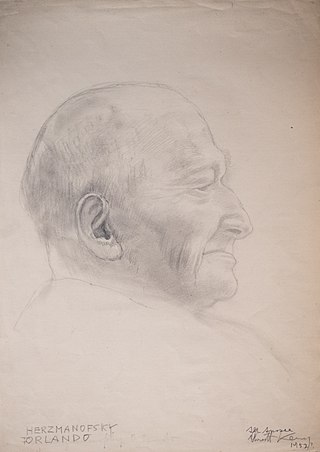
Heinz Gerstinger (born October 13, 1919 in Vienna; died April 28, 2016 [1] ) was an Austrian writer, playwright and historian.

Heinz Gerstinger (born October 13, 1919 in Vienna; died April 28, 2016 [1] ) was an Austrian writer, playwright and historian.
Heinz Gerstinger studied history and dramatics at the University of Vienna. He has worked for the universities of Graz and Vienna as well as for theaters in Graz, Augsburg and Vienna. While publishing in literary magazines and newspapers, he worked for the Austrian radio and television. Heinz Gerstinger was a member of the Austrian P.E.N. and the writers' association Österreichischer Schriftstellerverband.

Johann Bernhard Fischer von Erlach was an Austrian architect, sculptor, engraver, and architectural historian whose Baroque architecture profoundly influenced and shaped the tastes of the Habsburg Empire. His influential book A Plan of Civil and Historical Architecture (1721) was one of the first and most popular comparative studies of world architecture. His major works include Schönbrunn Palace, Karlskirche, and the Austrian National Library in Vienna, and Schloss Klessheim, Holy Trinity Church, and the Kollegienkirche in Salzburg.

Bernhard Wicki was an Austrian actor and film director.

Josef Weinheber was an Austrian lyric poet, narrative writer and essayist.

Heinz Oberhummer was an Austrian physicist and skeptic.

Grete Wiesenthal was an Austrian dancer, actor, choreographer, and dance teacher. She transformed the Viennese Waltz from a staple of the ballroom into a wildly ecstatic dance. She was trained at the Vienna Court Opera, but left to develop her own more expressive approach, creating ballets to music by Franz Schreker, Clemens von Franckenstein, and Franz Salmhofer, as well as dancing in her own style to the waltzes of Johann Strauss II. She is considered a leading figure in modern dance in Austria.

Julius Hans Weigel was an Austrian Jewish writer and a theater critic. He lived in Vienna, except during the period between 1938 and 1945, when he lived in exile in Switzerland. He was a lifetime companion of the Austrian actress Elfriede Ott.

Hohenwang is a ruined castle in Municipality of Langenwang, Styria, Austria. It stands on a hill at an elevation of 650 metres above sea level.
Franz Rosei is an Austrian sculptor and draughtsman. His brother is the writer Peter Rosei.

Hilde Spiel was an Austrian writer and journalist who received numerous awards and honours.

Gerhard Rühm is an Austrian author, composer and visual artist.

Bettina Balàka is an Austrian novelist, poet, essayist, playwright and short story writer. Recent novels include Eisflüstern, Kassiopeia (2010) and Unter Menschen.

Oskar Czerwenka was an Austrian operatic bass and academic teacher. He was a member of the Vienna State Opera from 1951 to 1986, performing 75 roles, including his signature role Ochs auf Lerchenau and premieres of new operas. He was also an author, visual artist and illustrator, and performed in concert. He received several awards, and the state music school in his home town was named after him.

Robert Schneider is an Austrian writer, who published novels including Schlafes Bruder, texts for the theatre, and poetry. His works have been translated to many languages. Schlafes Bruder became the basis of a film, a ballet, an opera and several plays, and received international awards. Schneider withdrew from writing in 2007.

Olga Flor is an Austrian writer.

Werner Gruber is an Austrian physicist, author, lecturer, and cabaret artist and is well known from ORF and as a member of the Social Democratic Party of Austria (SPÖ).

Fritz von Herzmanovsky-Orlando (1877–1954) was an Austrian writer and illustrator.
Max Niehaus was a German writer, dance researcher and ballet publicist.
Gottfried Hornik is an Austrian operatic baritone and voice teacher. He was a member of the Vienna State Opera for 25 years and appeared worldwide in leading roles. His signature role was Beckmesser in Wagner's Die Meistersinger von Nürnberg. He was awarded the title of an Austrian Kammersänger.

Schloss Blühnbach is a stately home in the Blühnbach valley in Werfen, Salzburg (state), Austria. Formerly, it was a hunting lodge of the Prince-Archbishops of Salzburg and Archduke Franz Ferdinand of Austria, heir to the Austro-Hungarian throne, whose assassination in Sarajevo triggered World War I. The estate is privately owned and ‘hermetically closed’ to the public.